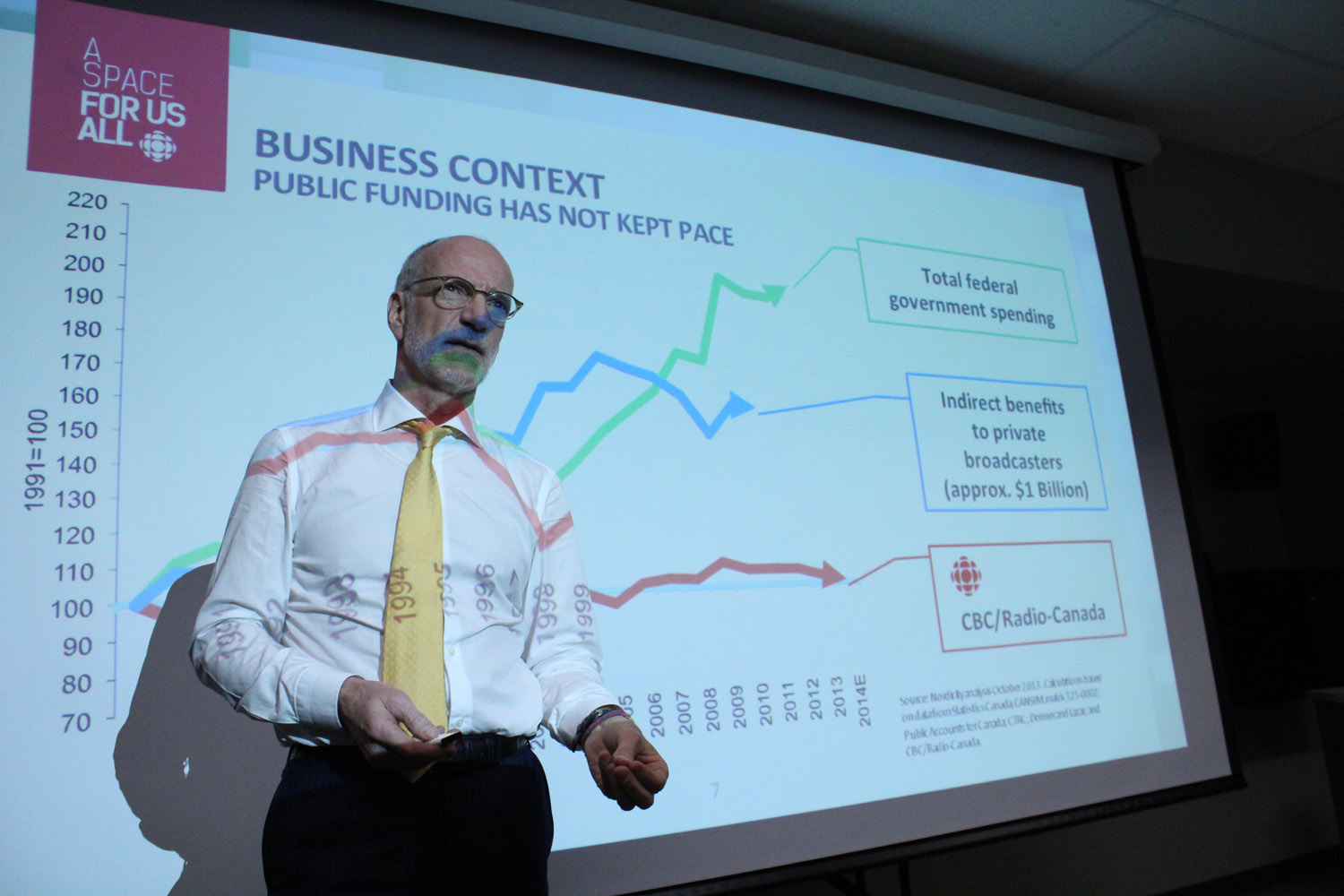CBC CEO spoke to a class full of Concordia journalism students on Jan. 21
On Jan. 21, Hubert Lacroix, the CEO of CBC/Radio-Canada, addressed a journalism class in order to discuss the future of Canada’s public broadcaster.
Concordia Journalism Chair and Associate Professor Brian Gabrial introduced Lacroix, who got more applause from the class than he had gotten as of late. This is in reference, of course, to the fact that he has been quite unpopular around the CBC these days because of the massive cuts, both in labour and finances, that have transpired under his stewardship.
“Before I start this, full transparency: I’m a double McGill grad,” he said, and the students in the class laughed. After making a few more jokes about his background, Lacroix began talking about CBC, and the jokes were soon a thing of the past. Instead, during the nearly 90-minutes he spent talking to students, three themes seemed to keep coming back: financing, Canadian content, and scandals.
Financing
Lacroix asked the room and asked how much cable costs most people, and how much people are willing to pay for it. One student mentioned that Bell had approached him saying that it would cost $50 a month.
“If you pay taxes, you actually give to CBC/Radio-Canada per year, for all the services, en anglais et en français, toutes les platformes, about 8 cents per day, $29 per Canadian, per year,” he said.
According to a document published by House of Commons back in 2008, it was recommended that Parliament should “increase the appropriations it gives the public broadcaster, from $33 per capita to $40 per capita a year over the next seven years.” This number was considered the amount required for continued quality production, and did not take into account inflation. And yet, funding has since decreased for the public broadcaster.
Another big topic was the CBC losing the rights to broadcast NHL hockey last year, a contentious and public decision which Lacroix said would cost too much, and that the money would be split in half between players and the NHL itself. “There is no way in the world a public broadcaster can justify spending $5.2 billion of taxpayer money on hockey.”
Lacroix also spoke about the high costs of producing content, both in Canada and elsewhere. For example, one hour of House of Cards costs $5 to 7 million to produce. He explained that that is why other Canadian networks often just pay for rights to air American content, which costs much less money, hence a lack of Canadian-produced content on all networks except for CBC.
Lacroix spoke of public broadcasting funding in other countries, showing just how low the CBC’s numbers are compared to others: the average for developed nations is $80 per citizen, per year.
“Everybody wants us to be the BBC. Look at the numbers. I’m sorry, but they have something like five times our budget, one language, and one time zone.”
Content
For a perspective on CBC’s content, Lacroix once again asked the room to name a program they watched on CBC or Radio-Canada in the last week. People mentioned Tout le Monde en Parle, CBC News, or The National, to name a few. He then asked how many had the CBC App, how many people watch Schitt’s Creek, Book of Negroes, and other shows. He asked students about what they like so much about Netflix, and on how everyone uses every platform: most Canadians have four, Lacroix explained. This has changed the way that content is delivered to Canadians.
“It’s not true that people watch television and series on their mobile phone yet, when we create content, we have to consider that a number of Canadians are still watching in the old way.”
Lacroix also spoke about why Canadian content is so important right now, showing the audience that other networks barely run any at all—most of the programs shown on other networks are produced in the U.S. He then explained why this was such a big problem.
“People ask: is public broadcasting a good investment? Well, for every dollar that the CBC gets, we generate about $4 for the Canadian economy,” Lacroix said. “We create jobs, we commission programs, there’s a whole industry that supports us, and, what’s interesting, is that if you take us away, you immediately take two and a half times the amount that the government invests in us, which is a billion bucks, and you take it away from the Canadian economy, because we indirectly create jobs for that value.”
To rest his case he said the CBC last year invested $762 million in Canadian content, while all the other canadian networks combined invested $500 million.
Scandals
Understandably, concerns came through on the many scandals the CBC has lately been associated with.
Lacroix spoke openly about the Jian Gomeshi controversy, saying that what happened led to a national conversation about sexual harassment. “I think our job is to manage this, go to the bottom of this and put in place the best possible programs and make them easy so that you’re not scared or fear retribution when you actually put your hand up and say ‘The behavior that I witnessed or that affected me was improper,’” he said.
Q&A
After the talk, The Concordian got the opportunity to ask a few extra questions to Lacroix.
The Concordian: What can we as consumers of the CBC do to make sure that there is a future for the public broadcaster?
Hubert Lacroix: I think that the time has come to ensure that if you believe in public broadcasting, that your voice is heard. That the people who choose on where the tax dollars go, if they hear that public broadcasting is important to Canadians in this country—because it does ensure Canadian culture, it ensures democracy in this country—if the people who are going to be seeking votes and who are elected understand that it is important for you … if you make those statements clear, that’s going to be the big difference maker.
C: You spoke a lot today about the importance of Canadian content, and yet one of the first things that the CBC cut was in-house productions. A lot of known personalities like Peter Mansbridge have spoken against this. What will the 2020 plan mean for in-house productions? Will they be returning?
HL: No. Because Canadian content doesn’t have to be done by CBC/Radio-Canada in-house. We can actually partner with an independent Canadian producer, creating Canadian content, and have it on our programing schedules in the same way. It’s just the making of it, inside our shop, with the infrastructures, with the square footage, with the technical equipment, that is what we have chosen to do less of, inside our shop. CBC actually was not doing much inside our walls … We commission the program. We decide, ok we are going to greenlight your project, we are going to invest in it, and we are going to show it on our network.
C: You mentioned that you give a lot of talks like these. Why do you think that it is important to talk about CBC today to university students?
HL: Because the interaction that I get, the questions that I get, the blank stares when I talk about CBC and our programming … shows me that in order to be able to reach the audience that is the next generation of our audience, plus, people in this faculty that could actually work for us one day, we have to continuously listen. Listening, seeing what your consumption habits are, what you’re doing in your schools, the subject matters that are important to you, the matters that you raise with me… all of that is absolutely key to how I see the broadcaster evolving … And because you are going to be involved in here, some of the challenges that will impact your work area.












